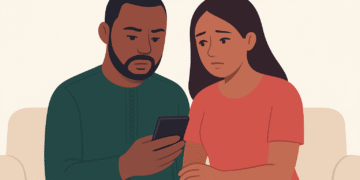By: Christian Aboagye | Social Worker & Mental Health Practitioner
IMMIGRATION CHANGES – 2025 – 4
Since March 11, 2024, newly arriving overseas care workers under the Skilled Worker visa have been banned from bringing dependants — spouses, partners, and children — to the United Kingdom. While presented as a measure to reduce immigration numbers, this policy, in reality, inflicts emotional harm and economic hardship on a workforce already stretched thin.
From where I sit as both a mental health practitioner and a social worker, the consequences of this reform are not theoretical — they are raw, personal, and devastating.
What Does the Policy Say?
Under the current immigration rules, care workers and senior care workers applying for a Skilled Worker visa after 11 March 2024 cannot bring family members to join them in the UK. Those who were already in the UK on or before that date, and who remain with the same sponsor, can still sponsor dependants. But that pathway has been closed to all new arrivals.
The government frames this as a necessary measure to combat abuse in the care visa system and to reduce strain on public services. But the truth is far more complicated — and far more painful.
The Emotional Toll: A Social Work Perspective
Separation from family is not just a footnote in a visa policy — it is a trauma in motion.
I have spoken with care workers, mostly women, who cry themselves to sleep after night shifts. They are working long hours in care homes or domiciliary settings, only to return to empty rooms and video calls with children growing up without them. Some have missed births, funerals, weddings. Others suffer silently with anxiety, depression, and a sense of profound isolation.
These are not just care workers — they are mothers, fathers, spouses. The emotional price they pay is steep, and it echoes into their work. How can someone care for others when their own hearts are breaking?
This policy, though bureaucratic in nature, is deeply personal in impact.
Legal Ramifications: From an Immigration Advisor’s Lens
Legally, the restriction carves a clear divide between two classes of migrants: those who can build a life in the UK, and those who are here to work — but not to live.
This is a regressive move. The right to family life is enshrined in international human rights law. By denying care workers the ability to live with their dependants, the UK is effectively creating a subclass of temporary workers with limited rights, limited stability, and limited wellbeing.
Many applicants were unaware of the rule change before arriving. Agencies are still recruiting without proper explanation. Some workers are now trapped in contracts they would not have accepted had they known the full consequences.
What Are the Broader Implications?
This policy risks creating a care workforce that is disconnected, unstable, and transient. Without the promise of family unity, retention rates will fall. Morale will plummet. The quality of care will suffer.
And let’s be honest — who is willing to cross continents to care for strangers, if they cannot even care for their own children?
The UK is setting a dangerous precedent. A care sector built on broken families cannot be sustainable.
What Needs Urgent Reform?
- Restore family rights for care workers under clear ethical recruitment standards.
- Support mental health services for migrant workers living in separation.
- Ensure transparency in contracts so workers understand what they’re signing up for.
- Address abuse not by punishing families, but by regulating recruitment and sponsor practices more effectively.
Final Word
No policy that separates parents from their children can ever be described as compassionate or just. This is not the Britain of shared values and fair opportunity. It is a Britain that risks closing its heart to those who give so much.
Let’s stop pretending this is about numbers. It’s about people. And it’s time we treated them as such.





























